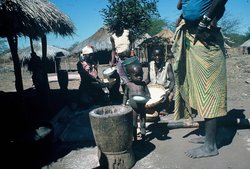On 2 April 2011, President Banda witnessed the signing of an MoU between the Zambia Development Agency (ZDA) and AG-Zam, a South Africa Company. According to their manager, the company will start the planting of sugar cane in the ‘next 21 days’. The ZDA states that AG-ZAM will produce 200,000 tonnes of sugar and 28 million litres of bio-ethanol per year, create 4,000 jobs, the company cultivating 15,000 hectares for itself and 3,000 hectares for villager out-growers.
No EIA detailing the impacts of land clearing, water extraction and social impacts for the scheme has been lodged with the National Environmental Council of Zambia. And it is not clear whether the customary residents were properly consulted and informed by their chief and the Government. There is certainly no sign of any co-operative or statutory community trust being formed. It therefore appears highly likely that the President has given the scheme the go-ahead in some haste - given the looming party elections. The carrot, of course, was the promise to create thousands of jobs under an outgrower scheme producing a product purely for export. And the chiefs involved clearly were suitably persuaded.
Ordinarily, the President of Zambia, in whom all land is vested, cannot, according to the Lands Act, alienate customary land unless it is with the Chief’s and the local authority’s consent, and only after consulting affected bodies or persons, and – in the case of GMAs - the Zambia Wildlife Authority (ZAWA). Article 16 of the Constitution forbids the compulsory seizure of state land or acquiring it in the absence of the authority of the law. This is laid out in the Lands (Compulsory Acquisition) Act of 1970 (Cap 189), which the President uses to acquire alienated land for public interest. Customary law does not have the same powers - the chief having to ask for it from the subject in question. In this respect, customary tenure enjoys superiority relative to leasehold in protecting the rights of customary landholders.
However, contrary to the Lands Act, and provided it is for agricultural development, the President can, under Article 16 (2) (ii), take or acquire land from its owner or occupier. Professor Michelo Hansungule of the University of Pretoria, in his analysis of Zambia’s Fifth National Development Plan in 2007, stated:
But the next paragraph is even more categorical in emphasising the overarching powers of the President on behalf of the State. In his bid to pursue the ends of a comprehensive land policy, the President can dispossess any occupier or owner of land, including the Chief, who enjoys rights in that land ‘and person claiming through and under them’ of the rights in that piece of land. It is remarkable these extensive provisions have not been used before by successive Presidents in customary areas. Nevertheless, the policy theme behind the clause is that in the interests of the public, the State should have higher hierarchy than the individual or even group of people as in customary areas
And perhaps, because they will produce ethanol, the President has been advised that he can always fall back on the Land Acquisition Act of 1970 (Cap 189), allowing him to acquire land if required for petroleum production. Indeed the Petroleum (Exploration and Production) Act 2008 under Part VI, section 41, requires written consent from a chief for petroleum mining activities in his chiefdom, from the Forestry Department in protected forests, and from the Zambia Wildlife Authority in National Parks, the licence holder being able to obtain a lease from the chief or the Ministry of Tourism, Environment and Natural Resources should he so wish. But where the mining licencee causes damage he is not required to compensate anyone for the removal of timber on protected forest land (Cap 199), nor for damage to customary land (Cap 198), only on land alienated under the Lands Act of 1995.
So much power vested in one man.













